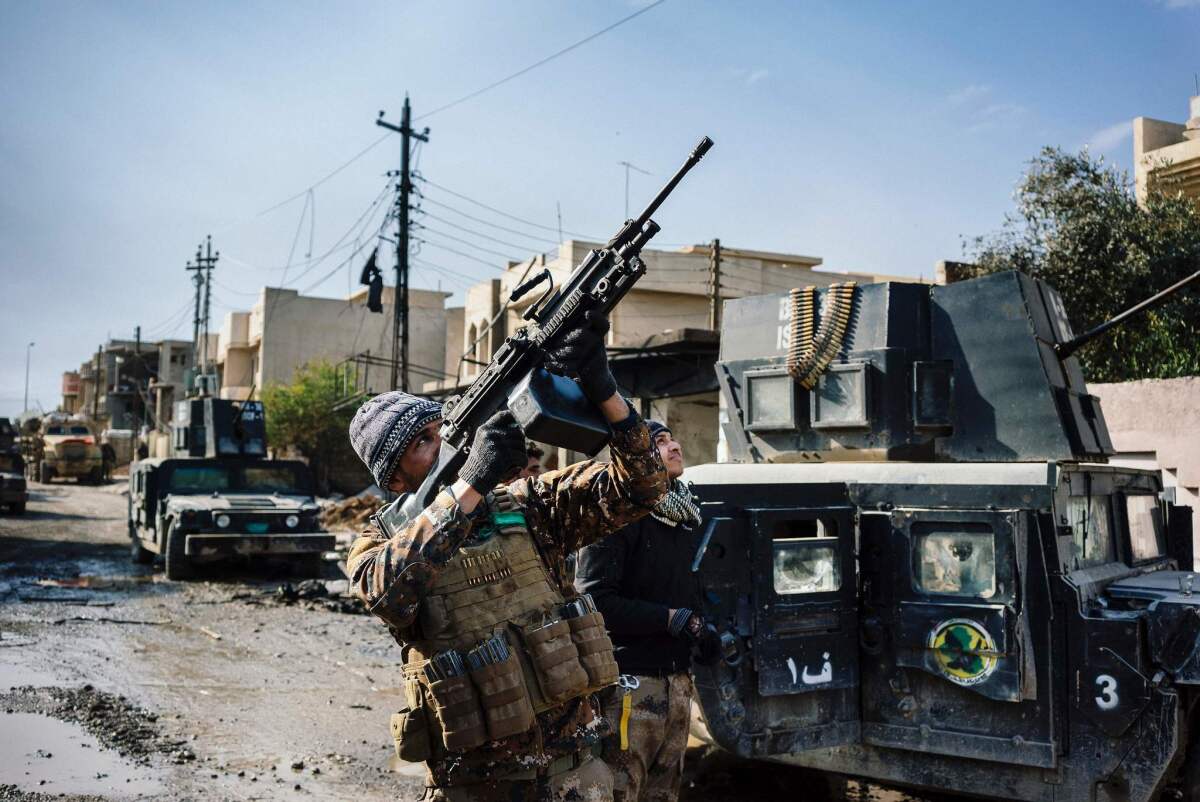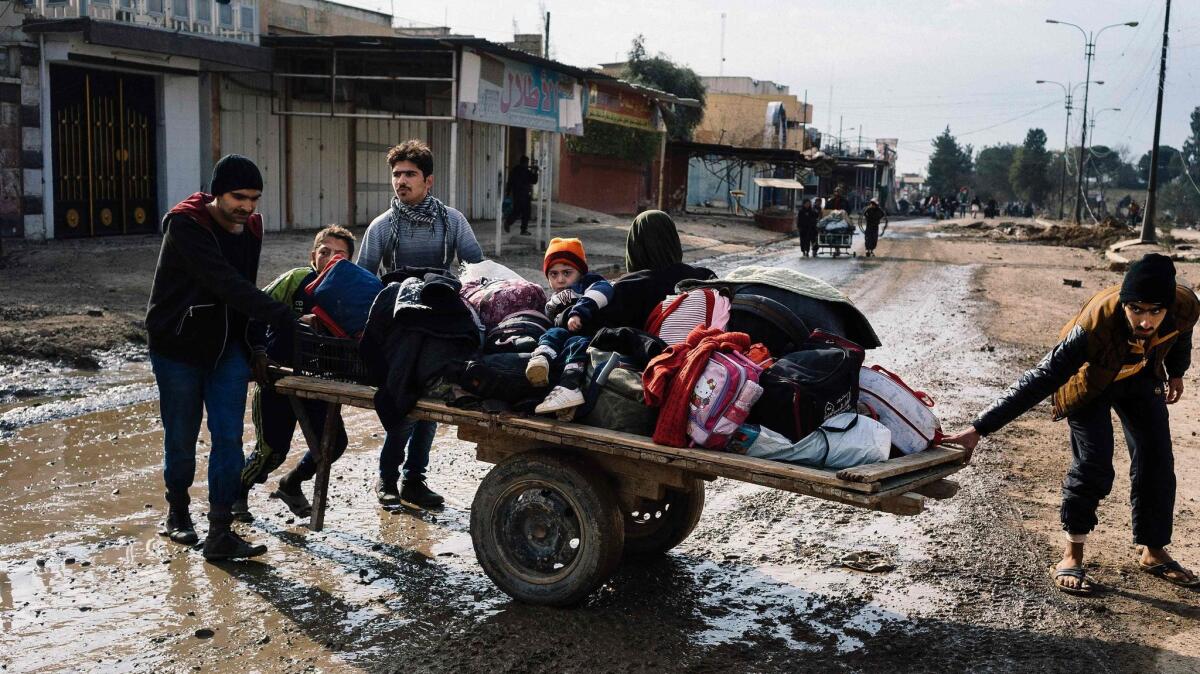Iraqi troops reach Tigris River, but more challenges ahead in battle for Mosul

Reporting from Cairo — Iraqi forces this week reached a bridge over the Tigris River that bisects the city of Mosul, gaining a strategic advantage over Islamic State militants whom commanders described as increasingly desperate.
“I saw many ISIL run away,” said Maj. Gen. Najim Jabouri, Iraqi army commander for the Mosul offensive, using an acronym for the militant group as he returned from the front line in Mosul on Monday. “Some of them go to another bank of the river. Some of them run to Rashidiyah, [to] the north of Mosul.”
Nearly three months after an offensive was launched to recapture the city, Iraqi forces still face significant challenges.
Iraqi soldiers and federal police moved aggressively to encircle the city late last month, approaching from the north, south and southeast with U.S.-led coalition air support destroying the last of five bridges over the Tigris that Islamic State had relied on for supplies.
As fighting intensified, so did civilian casualties, with more than 3,800 Mosul residents hospitalized for traumatic injuries, mostly gunshot wounds, according to the United Nations. The government had urged Mosul residents to shelter in their homes, but many have run out of food and water, and wells are running dry, the U.N. said.

The number of civilians displaced from the city increased sharply late last month from previous weeks, then dropped to about 1,000 a day this month, the U.N. said, with more than 135,000 displaced as a result of the offensive that started Oct. 17. Before the conflict, Mosul had a population of 1.2 million. Camps for the displaced on the city’s outskirts, many created just before the offensive started, are nearly full, according to the U.N.
Iraqi forces have been approaching steadily from the east since the start of the offensive, seizing about 70% of the city’s east side, where Jabouri said Islamic State “is collapsing,” having lost control of its headquarters, its apartments, Al Salam hospital and other strategic locations.
As Iraqi soldiers fight for control of Mosul University on the east side, Jabouri said they have employed urban warfare tactics, blocking roads to cut off the militants’ supply routes and stationing snipers in high-rise buildings “that give us good range so we can attack.”
But about 2,000 militants have retreated to the west side, where they built a stronghold even before the offensive, according to residents who have fled and those still in the city. There the fighters have been hiding among civilians in hospitals, schools and mosques, Jabouri said. “Very soon some operations will begin on the west side of the river,” he said.
Sabah Numan, a spokesman for the Iraqi Counter Terrorism Service, which has led the push into the city, said militants are encircled and trapped.
“They now can’t go out,” he said, and show “decreasing resistance.”
Numan said the city’s east side could be entirely freed within days, and, “if they order us to go further, we are ready for that.”
He said Iraqi troops, assisted by U.S. forces, have been protecting civilians while targeting areas where Islamic State fighters had been shooting and launching mortars indiscriminately.
Patrick Martin, an Iraq analyst at the Washington-based Institute for the Study of War, said Iraqi forces have made “significant progress to clear terrain.”
Airstrikes late last month that destroyed the Tigris bridges “stemmed the ability of ISIS to send [suicide car bombs] into eastern Mosul,” said Martin, using another acronym for Islamic State.
Iraqi forces have stumbled at times, surging westward too fast last month and being forced to recapture Al Salam hospital after losing it to Islamic State, he said. But they have learned from their mistakes, Martin said.
They still face major challenges as they try to maintain control of areas they have cleared of militants, he said.
The battle for Mosul: How to free 1 million residents without killing them »
“To say they reached a certain geographical point doesn’t mean they have cleared everything behind them. It takes longer to actually make sure those neighborhoods are clear,” he said.
He said Iraqi troops also still face stiff resistance from militants who have the advantage of an extensive tunnel network below the city.
Iraqi forces are working more closely than ever with the U.S.-led coalition, which has 5,000 troops stationed across the country supporting the offensive. About 450 U.S. forces are assisting in Mosul, behind the front line.
U.S. Maj. Gen. Joseph Martin, commander of U.S.-coalition ground forces in Iraq (and no relation to Patrick Martin) said it was “a sign of progress” that Iraqi troops had reached the river, but not necessarily a turning point.
“This is a very difficult fight. So you enjoy the progress that you have but you’re mindful of the complexity of the battle,” Martin said by phone from his headquarters in Baghdad on Monday.
As militants’ ranks thin, they have grown more desperate, he said, burning buildings as they flee, using less sophisticated and explosive suicide car bombs, less indirect fire on Iraqi forces and civilians.
“Their capacity is waning,” Martin said.
A challenge going forward will be the Sunni militants’ tendency to morph from army to insurgency. In recent days, Baghdad has been hit with a series of suicide bomb attacks in busy Shiite areas of the city that have killed dozens of people.
Martin called the bombings “acts of desperation trying to draw the attention of the government of Iraq away from the fight in Mosul.” He said he has spoken with an Iraqi commander responsible for Baghdad security who assured him “they’re mitigating that.”
Another challenge will be winning the hearts and minds of Mosul’s mostly Sunni residents so alienated by the Shiite-dominated national government two years ago that many embraced the invading militants.
Martin said the coalition has helped Iraqi forces “to assist the liberated population so they have less incentive to go somewhere else to get what they need.”
Jabouri said Mosul residents are supporting the Iraqi army in its fight against Islamic State.
“They help the security forces to find them. The image of ISIL is not like before,” the Iraqi commander said. “We work very hard to make bridges between the security forces and the people. My view is that whoever wins the people, wins the battle. Always I talk to my troops about that. I think we made a good foundation for a new relationship.”
molly.hennessy-fiske@latimes.com
Twitter: @mollyhf
ALSO
In the battle for Mosul, everybody’s taking selfies — and some of them may be incriminating
The ‘Krispy Kreme Familia’ and the black market doughnuts of Juarez
Death of former Iranian leader Rafsanjani could be blow to moderates
More to Read
Sign up for Essential California
The most important California stories and recommendations in your inbox every morning.
You may occasionally receive promotional content from the Los Angeles Times.











